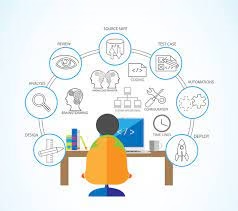
What is Code Review: 7 Steps Guide
You often hear about the importance of code review, however, what is code review? Read on, as we explain the “what”, “why”, “who”, “when”, and “how” of code review.
Code review: What it is?
Code review is a well-known software development process. It involves a systematic and structured review of code by competent individuals other than the developer. The code review process intends to detect software defects and coding issues early in the software development lifecycle (SDLC).
Code review isn’t the same as testing. It falls in the “verification” category of “verification & validation” processes. Code review doesn’t involve the execution of the code.

Get a complimentary discovery call and a free ballpark estimate for your project
Trusted by 100x of startups and companies like
Read more about code review checklist - what to include and code review checklist: stop producing bugs in our blog.
When should you have the code review exercise?
You should have the code review process as soon as the developers complete coding. Project teams should complete the code review process before the start of testing. Early code review helps you to identify bugs and other coding issues early in the SDLC.
Why should you have a code review?
Code review offers the following advantages:
- The sooner you find defects, the less it costs you to fix them. Code review helps you to identify defects even before testing. That helps you to meet the schedule, quality, and budget requirements of the project.
- While testing is very important, you can never test your code fully. There can always be branches of code that you couldn’t test. Code review helps to find bugs in those branches.
- Testing does a lot, however, it can’t do everything. You can’t assess the maintainability of your code by testing it. You need a code review for that.
- Code review works very well to detect certain kinds of issues. E.g., security vulnerabilities can be hard to detect in testing. Experienced reviewers can find them.
Who should review your code?
You need individuals other than the developer to review the code. Code reviewers should have sufficient software development skills and experience. More importantly, they need to have code review experience. Code reviewers should have the required time at hand.
Peer programmers can be the code reviewers in your project. Alternatively, you can engage independent code reviewers.
How to conduct an effective code review exercise in 7 steps?
An effective code review exercise needs the following 7 steps:
1,200 top developers
us since 2016
1. You need to identify peer reviewers or engage independent reviewers ahead of time. Work with them to establish the code review schedule.
2. Ensure that the reviewers have a sufficient understanding of the project. Share the relevant documents for this.
3. Freeze changes to the codebase.
4. Provide the required access to the codebase to the reviewers.
5. Reviewers should use code review tools to support their work if needed.
6. Code reviewers should focus on aspects like functionality, performance, scalability, code quality, documentation, security, and maintainability.
7. Reviewers should prepare code review reports containing the details of the bugs and issues.
You need to ensure that your development team closes the defects and issues identified by the code reviewers.
Want to hire expert developers and experienced code reviewers? Contact DevTeam.Space.
FAQs
The best code review tools are Review Board, Crucible, GitHub, Phabricator, Collaborator, CodeScene, Visual Expert, Gerrit, Rhodecode, Veracode, Reviewable, and Peer Review for Trac.
The top static code analysis tools are Raxis, SonarQube, PVS-Studio, DeepSource, Embold, SmartBear Collaborator, CodeScene Behavioral Code Analysis, Reshift, Veracode, Fortify Static Code Analyzer, CAST, CodeSonar, and Coverity.
You can use the following tools to verify the blockchain smart contracts written in Solidity: VeriSol, SmartCheck, Slither, SmartAce, and VeriSmart.


